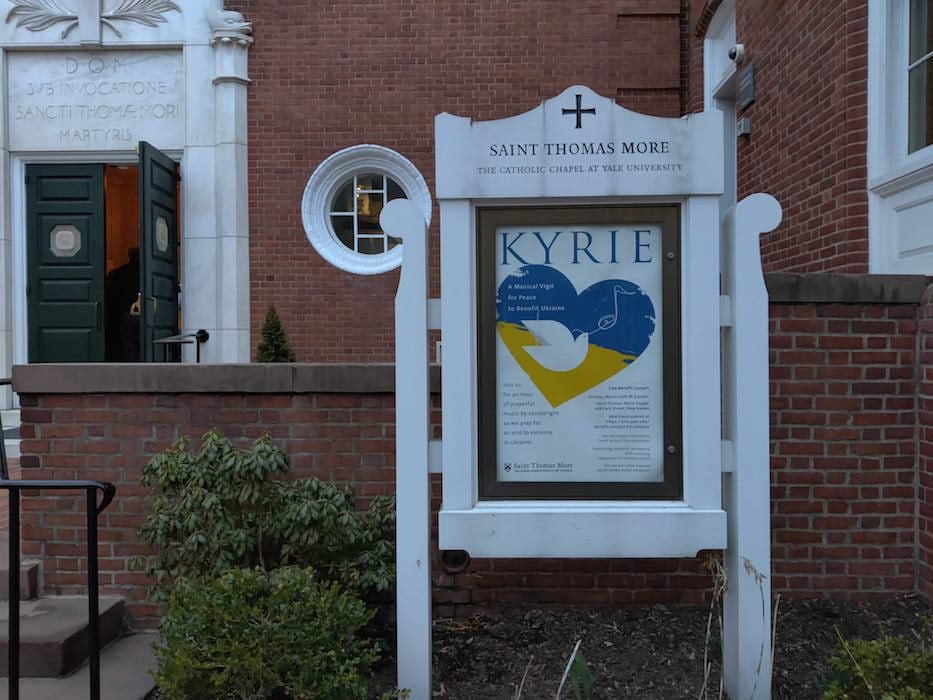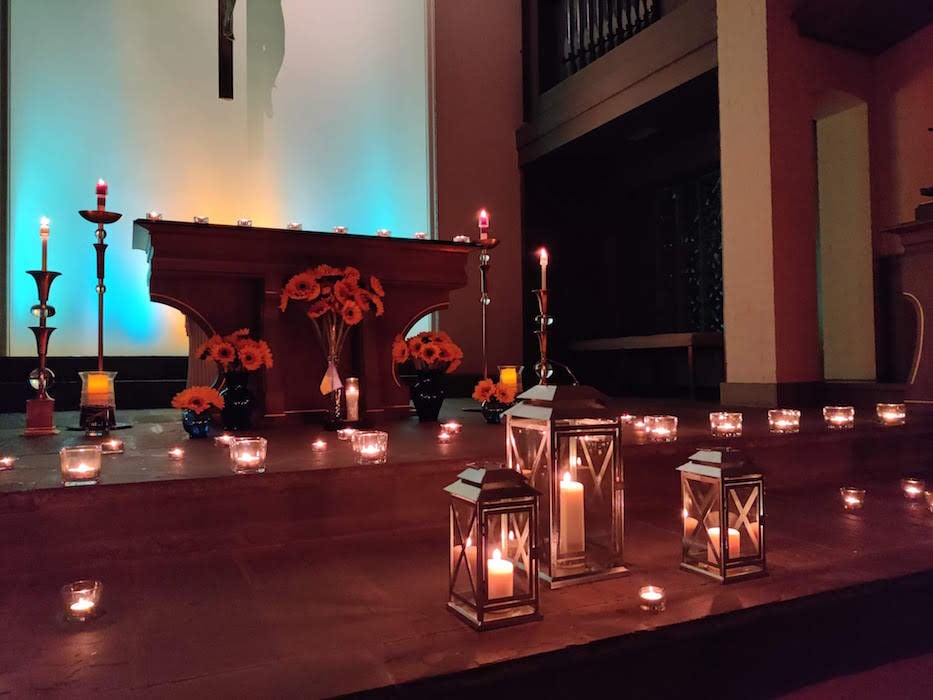
Music | Arts & Culture | Ukraine

Jadan Anderson Photos and Video.
Saint Thomas More was bathed in a warm, golden lowlight. Just beyond the candles delicately arranged on the altar, sounds of the church organ reverberated through the chapel. The higher melodic tones of Johann Sebastian Bach’s O Mensch, bewein' dein' Sünde Groß (Oh man, bewail thy sins so great) drifted upward to the ceiling, while the lower notes of the organ stayed close to the ground, rumbling between the church pews.
The half-step intervals bloomed into a tension, sustained into silence before the song resolved into a soft major chord.
It was the fourth song in last Sunday’s “Kyrie: A Musical Vigil for Peace to Benefit Ukraine”, organized by and hosted at Saint Thomas More. The benefit concert became a collective prayer for Ukraine, as well as a call for support through donations toward Ukrainian relief. Friar Ryan Lerner, chaplain at Saint Thomas More, opened the night with prayer alongside Karolina Wojteczko. Wojteczko, who is the interim director of Music at Saint Thomas More Chapel, was the vocalist for the night.
“Why am I doing this?” she pondered aloud. The singer immigrated to the United States at the age of 12 from Bagny, Poland at the border between Poland and Belarus. “I was angry when I heard of what was going on between Russia and Ukraine. I couldn’t believe it is 2022, and this is all still happening.”
The audience sat in silent solidarity. Wojteczko spoke earnestly to attendees in an understated powder blue gown.
“Then,” she sighed out. “I turned my anger into a question about what I could do to help.” With a half smile she joked, gesturing with open hands, “What can I do besides sing?”
Wojteczko, along with composer Julian Revie, cellist Miriam Liske-Doorandish, and violinists Katherine Arndt and Michael Ferri ,performed a 14-song set, including pieces sung in Ukrainian, like the Ukrainian Orthodox chant called The Sorrowful Mother.
The set was not ordered into an arc of themes. The Sorrowful Mother’s traditional chant melody was a resigned and quiet mourning, with Wojteczko’s hauntingly clear voice resounding like a bell. Sure on This Shining Night, based on an untitled poem of James Agee’s, was peaceful and hopeful. Even within a piece itself, like "Meditation" from the opera Thaïs, the violin’s melody changed from dark and urgent to victorious at the end of the piece, the final bows of victory hanging high in the air of the chapel from which the sound came.

All the while, people in the pews prayed on their knees. Others gazed, contemplative, at the altar. The crucifix was backlit by a golden light that matched the candles dotting the altar, flanked on either side by vibrant streaks of blue—a reflection of the Ukrainian flag. In front of the communion table, richly orange sunflowers peeked out at the audience.
While they are the national flower of Ukraine, over half of Ukraine’s sunflower production comes from border regions now occupied by Russian forces. Even the figure of Jesus on the cross had a dove fastened to the statue’s left hand, a clear symbol of peace.
Before the final song of the night, Wojteckzo came down from the choir loft to address the audience one final time. She first introduced the final song, Moja matko, ja wiem, one that was originally written in Ukrainian but has since then been translated into Russian and Polish and is a popular folk song in all three countries.
“This song is special to my heart because, probably like many of you, I grew up with it,” she said. “We leave this song to you as a closing prayer for unity and peace.”
Then, she shared a message from a pastor in Kyiv. “He asked me to thank everyone in the room," she said. "He said 'I need you to say it.' Then he said to me specifically, 'If the world is with us, then we will be okay. What gives us strength is you in the world. As long as we know that you are with us, we will be strong.'”
The song, sung in Polish last Sunday night, begins, “Dear mother, I know you haven’t slept many nights/Since I left my home to face an unknown world.” The rest of the lyrics follows the child dwelling on the love of his mother, manifested in small gifts like linen towels and her ability to comfort the child.
At this last song, the people in the pews perked up. Some swayed in their seats to the bobbing instrumentals; others cried, moved by the sound of their home. Unlike the silence of the night until this point, murmurs of people singing and humming along traveled from the back to the front of the sanctuary, leaving as echoes of the melody that drifted from the choir loft.
Donations can be made here.

